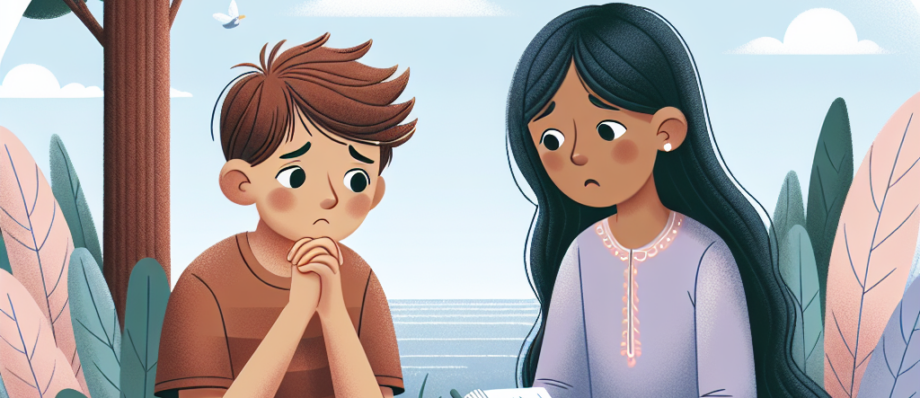Discovering Peace: Understanding and Addressing Anxiety in Children
Anxiety in children is a topic that resonates with many parents and caregivers. It can be heart-wrenching to see a child struggle with worry and fear. But there’s hope! By understanding anxiety in children, we can support them and guide them toward a healthier, happy life.
What is Anxiety in Children?
Anxiety is a normal response to stress or uncertainty, and it’s a feeling everyone experiences, including children. However, when anxiety becomes overwhelming or interferes with daily activities, it can be classified as an anxiety disorder.
Key Points:
- Anxiety in children can manifest as irritability, fatigue, trouble sleeping, or even physical symptoms like headaches or stomach aches.
- It often reveals itself through behavioral changes such as becoming overly clingy or avoiding social situations.
Quote:
"Anxiety disorders are among the most common mental health challenges children face, affecting nearly 1 in 8 children."
Recognizing the Signs: How Do You Know if Your Child Has Anxiety?
Recognizing the signs of anxiety in children can be challenging. Children might not always verbalize their feelings, and their anxiety can manifest in unexpected ways.
Signs to Look Out For:
- Frequent reassurance-seeking: "Are we going to be late?" or "What if I can’t do it?"
- Avoidance of activities or social interactions.
- Physical complaints without a medical cause, like frequent tummy aches.
- Unexplained outbursts of tears or anger.
By staying vigilant and attuned to these signs, you can step in to provide the support your child needs.
My Personal Journey with Childhood Anxiety
As a parent myself, I’ve faced the heartache of seeing my child struggle with anxiety. I remember how my daughter, Lily, would start shaking at the mere thought of a school presentation. It wasn’t easy; there were nights when her worry would keep her awake, and in turn, kept me awake too.
What helped immensely was seeking professional help. After several sessions with an online therapist, Lily learned coping strategies, such as breathing exercises and visualization techniques, which significantly reduced her anxiety levels. Online therapy provided the convenience and comfort of being at home, which was a game-changer for us.
The Benefits of Online Therapy for Anxiety
Speaking of online therapy, it’s a fantastic resource for dealing with anxiety in children:
- Convenience: Access therapy from the comfort of your home.
- Flexibility: Schedule sessions at times that work for your family’s busy schedule.
- Comfort: Many children feel more at ease expressing themselves in a familiar environment.
- Accessibility: Easy access to professional help regardless of geographical location.
If you’re considering this option, start today and discover how it can make a big difference. 🌟 Click here to explore online therapy options for your child. Let’s embark on a journey to reduce anxiety together!
Strategies to Help Your Child Overcome Anxiety
Empowering your child with tools and strategies can significantly reduce their anxiety levels.
Here are some strategies:
- Routine and Structure: Predictable routines can be very comforting.
- Mindfulness Activities: Practice deep breathing or meditation with your child.
- Positive Reinforcement: Praise their efforts to face their fears, no matter how small.
Example Technique:
Deep Breathing Exercise: Teach your child to inhale deeply through their nose, hold for three seconds, then exhale slowly through their mouth. Practice this daily to make it a habit.
Why Early Intervention Matters
Early intervention cannot be overstressed. The sooner we address anxiety, the better outcomes children tend to have. Left untreated, anxiety can lead to more significant issues like depression or academic decline.
Early intervention benefits include:
- Improved emotional regulation.
- Enhanced social skills.
- Better academic performance.
FAQ About Anxiety in Children
What causes anxiety in children?
- A variety of factors can contribute, including genetics, environmental stressors, and learned behaviors.
Can a child outgrow anxiety?
- Some children may naturally outgrow certain anxiety forms, but others might need professional intervention to manage their symptoms effectively.
Is medication necessary for treating anxiety in children?
- This depends on the severity. Often, therapy alone can be enough, but medication may be recommended in some cases.
How can I support my child at home?
- Create a supportive environment, encourage open communication, and practice relaxation techniques together.
Remember, you’re not alone in this journey. Taking the first step is often the hardest, but it’s also the most rewarding. Seek help, trust the process, and know that brighter days are ahead for you and your child.
For more information and support, visit the online therapy platform and consider starting a consultation today 👉 Click here.
Together, let’s help our children thrive and not just survive. 🌈👧👦
Disclosure:
Hospitals.net is a participant in the Amazon Services LLC Associates Program, an affiliate advertising program designed to provide a means for sites to earn advertising fees by advertising and linking to Amazon.com, .ca, .co.uk, etc.
AI Disclaimer:
Hospitals.net uses artificial intelligence (AI) tools to assist in gathering and summarizing product information, including reviews and other relevant data for Amazon products and services. While we strive to ensure the accuracy of the information provided, AI-generated content may not always reflect the most up-to-date or accurate details. The information on our site should not be considered professional advice, and users are encouraged to verify any product details directly with Amazon or other official sources before making a purchase.
We do not guarantee the completeness or accuracy of the AI-generated content and are not liable for any discrepancies or errors. Any reliance on the information provided is at the user’s own risk. By using this site, you acknowledge that product availability, pricing, and other details may change over time, and Hospitals.net is not responsible for these changes.
Health Disclaimer:
The health products and information provided on Hospitals.net are for informational purposes only and are not intended to substitute professional medical advice, diagnosis, or treatment. Always consult a qualified healthcare provider or medical professional before using any health products or following any advice you find on this site. The content on Hospitals.net, including product recommendations and reviews, is not a substitute for individualized care from a healthcare provider.
We make no warranties or representations regarding the effectiveness, quality, or safety of the products listed on our site. Any use of these products is solely at your own risk. Hospitals.net is not liable for any harm, injury, or adverse effects that may result from the use or misuse of the health products or information provided.
Please read all product labels, warnings, and directions provided by the manufacturer before using any product. If you have any questions about a product or its suitability for your condition, we recommend contacting the manufacturer directly or consulting a healthcare professional.
If you have any concerns regarding the accuracy of the information on this site, please contact us for further clarification.



